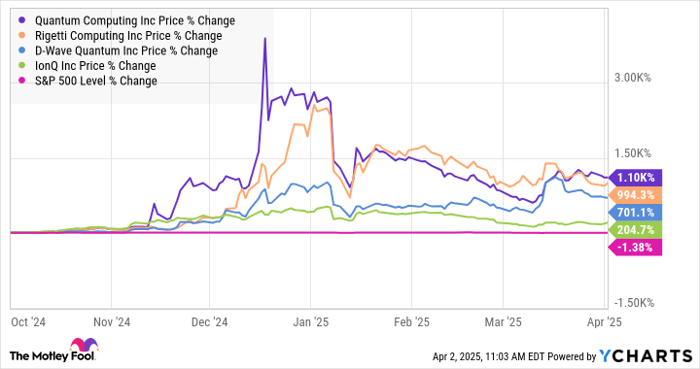March Sees Divergent Trends in Quantum Computing Stocks
Stocks in the quantum computing sector experienced significant fluctuations in March. Data from S&P Global Market Intelligence reveals that D-Wave Quantum (NYSE: QBTS) surged by 38.7%, while Quantum Computing (NASDAQ: QUBT) increased by 31.9%. In contrast, shares of Rigetti Computing (NASDAQ: RGTI) fell by 6.4%, and IonQ (NYSE: IONQ) experienced a decline of 10.2%.
March Highlights in Quantum Computing
March was an eventful month, featuring several key developments:
- Three companies reported earnings during the month.
- A high-profile industry conference brought noteworthy implications for the market.
- D-Wave announced a significant milestone in its technology research.
D-Wave’s Breakthrough Amidst Financial Challenges
D-Wave’s substantial gain can be traced back to a pivotal announcement on March 12. The company revealed that its annealing quantum computing systems successfully addressed “a useful, real-world problem.” This innovation was touted in a “landmark” research paper that D-Wave claimed “unequivocally validates” its achievement, notably the first of its kind in the industry.
On the following day, D-Wave disclosed its earnings report. While sales remained flat year over year, net losses under generally accepted accounting principles (GAAP) declined from $0.60 to $0.15 per share. This combination of promising technology and improved financial performance led to investor enthusiasm, driving the stock price up by 92% within three days and positively influencing the broader sector.
Conversely, both Rigetti and Quantum Computing posted quarterly results that significantly missed analyst forecasts. Rigetti’s fourth-quarter sales plummeted by 33% year over year, with net losses widening from $0.09 to $0.68 per share. Similarly, Quantum Computing reported a 17% decrease in sales coupled with a 35% rise in operating expenses, increasing net losses from $0.09 to $0.47 per share. Despite these disappointing earnings reports, Quantum Computing’s stock did not see drastic changes.
Adding to the industry’s volatility, Nvidia diverted attention from Quantum Computing’s earnings report by hosting “Quantum Day” at its GTC technology conference. CEO Jensen Huang used this platform to clarify previous comments about the quantum computing industry’s practical applications being roughly 20 years away, an apology that investors met with skepticism, further contributing to the fluctuating stock prices on March 20.
Long Road Ahead for Quantum Computing
D-Wave’s moment of “quantum supremacy” may have temporarily boosted the entire sector, reminiscent of how Alphabet’s advancements in error-correcting technology sparked interest in November 2024. However, skepticism arose as Scientific American reported that D-Wave’s research paper faced significant criticism during the peer-review process in March 2024, including findings that cast doubt on the validity of its claims.
The quantum simulation of magnetic materials, a task estimated to take millions of years on conventional computers, was reportedly accomplished in just two hours using a standard laptop with a newer algorithm. This revelation was not surprising, considering the rapid price adjustments following initial gains. Currently, the pure-play quantum computing stocks are buoyed by optimistic speculations. Over the past six months, all four quantum companies observed managed to triple their valuations, with IonQ leading the pack, attracting less speculation than smaller rivals while still reflecting a steep rise based on strong promotional messages rather than empirical progress.

QUBT data by YCharts.
In summary, the quantum computing sector has been riding a speculative wave since Alphabet’s unveiling of its Willow announcement. As this excitement wanes, stocks in this domain are likely to trend downward.
While quantum computing holds the potential to revolutionize various industries in the long run, selecting long-term winners at this stage remains challenging. For those invested in pure-play quantum computing equities, it’s advisable to limit exposure to levels you could afford to lose entirely.
Alternatively, consider aligning with established technology giants such as Alphabet and Nvidia. Many of the companies in the so-called “Magnificent Seven” are deeply engaged in quantum computing research, allowing for partial exposure to this emerging field while still being anchored by solid business fundamentals.
Seize a New Investment Opportunity
Have you ever felt like you missed the opportunity to invest in high-performing stocks? Now may be the time to take notice.
Our analysts occasionally issue a “Double Down” Stock recommendation for firms poised for potential gains. If you’re worried that you’ve missed out already, now is an optimal time to consider investing before it becomes too late. The figures highlight the value of these alert opportunities:
- Nvidia: Investing $1,000 in 2009 would have turned into $285,647!*
- Apple: A $1,000 investment in 2008 would have grown to $42,315!*
- Netflix: If you put $1,000 in 2004, you’d have $500,667!*
Currently, we are issuing “Double Down” alerts for three outstanding companies, and this may be one of your last chances to capitalize on this remarkable opportunity.
Continue »
*Stock Advisor returns as of April 1, 2025
Suzanne Frey, an executive at Alphabet, serves on The Motley Fool’s board of directors. Anders Bylund holds positions in Alphabet and Nvidia. The Motley Fool has investments in and recommends Alphabet and Nvidia. For details, please refer to The Motley Fool’s disclosure policy.
The views and opinions expressed herein are those of the author and do not necessarily reflect the views of Nasdaq, Inc.








